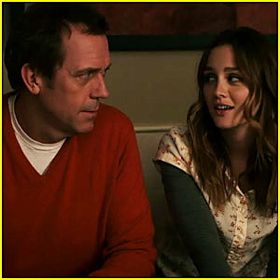'The Oranges' Is Sweet, But Not Juicy

3/5
When high-strung matchmaker Carol Ostroff (the hilarious Allison Janney) finds out that her 20-something daughter Nina (Leighton Meester) begins dating the middle-aged father (Hugh Laurie) of the neighboring family, she detonates like a ticking bomb: “If you want us to take you seriously, then let me ask you a few questions,” she begins, her voice straining with uncontrollable fury. “Are you OK sucking David’s old balls?” This crude, but not entirely superfluous question introduces one of the few instances of true comedy in this otherwise forlorn quirky drama, and supplies much-needed comic relief in a film that suffers from awkward interactions and bouts of identity crisis. And yet this is part of The Oranges’ charm. With scenes that trail off like unfinished sentences and jokes that only half work, The Oranges stands proudly as this season’s glorified indie holiday film, which hopes to break patterns — subtly, modestly — as it assumes the deceivingly traditional shape of a classic family holiday drama.
If pressed to define the theme of The Oranges, one would have to settle for restlessness. Every character is stuck in a rut, yearning desperately for a transition or diversion of sorts. The unsettling feeling that things are not quite as stable as they seem pervades the film and traverses both genders and generations. Paige (Catherine Keener) and David (Hugh Laurie) Walling are a rapidly disintegrating couple whose affection for one another can no longer sustain mutual interest in their respective pursuits. He retires nightly to his man cave, where he falls asleep watching Korean basketball, and she frets over her caroling group and becomes a dedicated fundraiser for an NGO that saves goats and children (or something like that). But their dysfunctional relationship is only the more explicit representation of the greater ennui that plagues the entire family, which includes live-in daughter Vanessa (Alia Shawkat), and their friends and neighbors, the Ostroffs — comprised of gadget-obsessed Terry (the always entertaining Oliver Platt), who boasts a large personality with no venting channel except his friendship with David, and Carol, who pretends the former is “invisible.” Adam Brody as “the only son in history to be cock-blocked by his father” (although we doubt that) makes only intermittent appearances as Toby Walling, but delights with his comic timing and, well, normalcy, which is sufficiently rare in the film that we come to appreciate its moments of lucidity.
Set in West Orange, N.J., the film spans the bulk of holiday season from Thanksgiving to Christmas, which is turned on its head by the return of the Ostroff’s daughter, Nina, who flocks home after she catches her fiancé (Sam Rosen) canoodling with another woman. Despite her five-year long absence, she quickly makes up for lost time by pulling an American Beauty, though significantly toned down and far less lascivious, when she gets involved with David (not Toby, as her mother had hoped). And yet it’s all so innocent, so lust-less. There’s no tawdry sex, no flammable passion, just two adults — engulfed, but never consumed, by the surrounding drama — that comfort each other. As the wife moves out, and the girlfriend moves in, we are actually made to believe — even hope — that these two lost souls might have a chance at a serious, no-nonsense relationship; at real happiness. This combination of unexpected turns and the bizarrely effortless union at its core make us root for The Oranges, for this breaking of molds, even when it fails to properly entertain or click as a whole.
Although Ethan (the ex-fiancé) and Paige (the now ex-wife) reinsert themselves into the picture along the way, it is not their lingering presence that ultimately drives David and Nina apart. In fact, the odd pair comes abruptly to an unspoken agreement that, despite their happiness together, they are not the cure to each other’s malaise — and almost suddenly, this creeping suspicion that has been slowly taking root sprouts anticlimactically, as the two casually part ways as sedately as they had come together. While it leaves no loose ends, ensuring that each character is left with something to do, The Oranges doesn’t quite end happily either, barely spitting out a closure to elevate it from sheer aimlessness. But this small revolution does light the match for one character’s transformation: our sarcastic narrator and the youngest of the Wallings, Vanessa, the most quintessentially indie icon of the film, whose incombustible aspirations to become a New York designer seem to catch fire only at the very end, if only to avoid the griping aftertaste of two hours of meandering and extinguished sparks.
The most puzzling element of the film is its R-rating: beyond a couple of expletives, there is little to warrant this unfulfilled promise of decadence. If anything, it's the taboo subject matter that makes it supposedly unfit for certain eyes. But what The Oranges sacrifices in entertainment, in coherence, even in the chemistry of the central couple, it makes up in artistic and social statement — and in the guilty pleasure of watching the (mostly) superb cast bring to life a mediocre script.
RELATED ARTICLES
Get the most-revealing celebrity conversations with the uInterview podcast!





Leave a comment